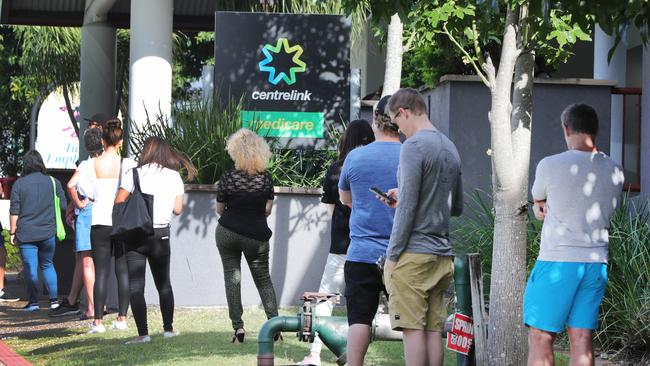JobSeeker cut should have erred on the side of kindness
Many Aussies struggling to find work will be unfairly penalised by a JobSeeker cut that aims to cut off the few bludgers.

Patrick Carlyon
Don't miss out on the headlines from Patrick Carlyon. Followed categories will be added to My News.
Everyone knows someone who has taken advantage of generous government handouts during the pandemic.
It’s a flaw of any subsidy system; that those in need receive payments alongside the bludgers.
The instant end of so many jobs last year, from the travel industry to retail to hospitality, shifted unkind perceptions of the long-term unemployed.
Good, motivated workers couldn’t find jobs. They queued for hours outside Centrelinks early in the pandemic.
Smudged by the blue-sky rhetoric of rising house prices and low interest rates, the truth remains that many decent Australians will struggle to find work for a long time to come.

JobSeeker payments before the pandemic were $40 a day. It wasn’t much, not when essential costs, such as rent, food and medicine, were accounted for. No one was living high on JobSeeker.
The federal government will adjust the rate of the (slightly higher) JobSeeker payments during the pandemic. In reducing the daily rate to $44 a day, it seeks to get about 1.2 million JobSeeker recipients back to work.
In figures reported in the Herald Sun on Tuesday, the highest rates of recipients without official barriers to work, such as health, are gathered in parts of greater Melbourne. They are the so-called bludgers that collectively should be seeking work.
The Opposition, along with welfare lobby groups, wanted to see JobSeeker payments increased to as much as $65 a day. And they had a point.
The world is unlike the world that once was. The lockdowns of 2020 remain fresh. Their wider effects cannot be reliably measured any time soon. Entire industries will take years to rebuild.
It’s different, too, in that Australian governments have legitimate excuses for not balancing the books anymore. The pandemic has generated hundreds of billions of dollars in debt that will take decades to repay. There was no other way.
Australia boasts one of the fairest systems in the world. Health-care is available to all. We help those who cannot help themselves.
Handouts will always be exploited by some Australians. Yet those genuinely in need, for reasons beyond their control, should not suffer for the desire to scrimp tiny fractions of massive spending programs.
In adjusting JobSeeker payments, the federal government should have erred on the side of kindness.
An extra $4 a day to the pre-pandemic payment isn’t going to make much difference.
Yes, bludgers would benefit from higher payments. But denying them only penalises those motivated contributors who need our help through no fault of their own.





